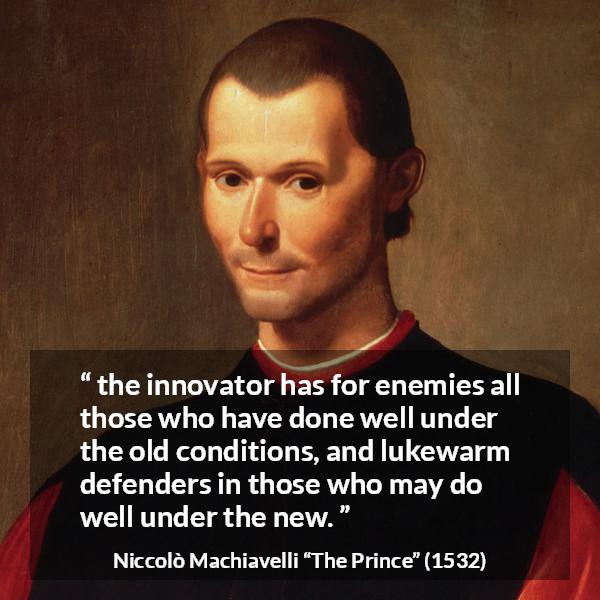

In the end, Machiavelli argues, fewer lives will be lost and less suffering incurred by the Prince who can govern EFFECTIVELY. Allowing other considerations to affect such judgements will only provide an advantage to third parties who will exploit it. He argues that the Prince’s #1 priority is to safeguard his holdings and maintain stability within his borders. Should such murdered and subjugated populations thank the princes for their unwaivering morality? Machiavelli says HELLS NO.

However, Machiavelli, in his famous use of end justifying means, supports the rightness of his position by citing numerous examples of “princes” who, in acting "all just and proper like” in relation to their neighbors and subjects, led their people right into the waiting arms of bondage and slaughter at the hands of those who were less vituous in their thinking. Holy snickerdoodles that's amoral!! Uh.yes, by definition it is. Rather, Machiavelli was demonstrating, through reasoned analysis based on numerous historical examples, that the most effective way to govern a population is through decision-making based on the current situation without muddying up the waters with considerations of morality. Despite popular perception, Machiavelli, whose name has often been used as a synonym for political ASSHATery, was not arguing that it’s better to be immoral, cruel and evil than to be moral, just and good. That single statement boys and girls is the crux at the heart of the matter resting at the bottom-line of Niccolo Machiavelli’s world-changing classic on the defining use of realpolitik in governance and foreign policy. The first is rightly man’s way the second, the way of beasts. There are two ways to fight: one with laws, the other with force. Mercenaries are dangerous because of their cowardice 10. Nations based on mercenary forces will never be solid or secure. A Prince, who rules as a man of valor, avoids disasters, 8. A Prince needs a friendly populace otherwise in diversity there is no hope. Prominent citizens want to command and oppress the populace only wants to be free of oppression.

Without faith and religion, man achieves power but not glory. Opportunity made Moses, Cyrus, Romulus, Theseus, and others their virtue domi-nated the opportunity, making their homelands noble and happy. If a Prince is not given to vices that make him hated, it is unsusal for his subjects to show their affection for him. So it is that to know the nature of a people, one need be a Prince to know the nature of a Prince, one need to be of the people. Hence: Can Machiavelli, who makes the following observations, be Machiavellian as we understand the disparaging term? 1.

Machiavelli needs to be looked at as he really was.


 0 kommentar(er)
0 kommentar(er)
